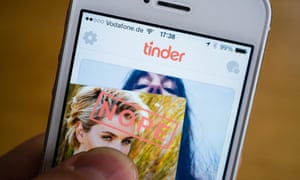What will happen if this treasure trove of data gets hacked, is made public or simply bought by another company? I can almost feel the shame I would experience. The thought that, before sending me these 800 pages, someone at Tinder might have read them already makes me cringe.
Tinders privacy policy clearly states: you should not expect that your personal information, chats, or other communications will always remain secure. As a few minutes with a perfectly clear tutorial on GitHub called Tinder Scraper that can collect information on users in order to draw insights that may serve the public shows, Tinder is only being honest.
In May, an algorithm was used to scrape 40,000 profile images from the platform in order to build an AI to genderise faces. A few months earlier, 70,000 profiles from OkCupid (owned by Tinders parent company Match Group) were made public by a Danish researcher some commentators have labelled a white supremacist, who used the data to try to establish a link between intelligence and religious beliefs. The data is still out there.
So why does Tinder need all that information on you? To personalise the experience for each of our users around the world, according to a Tinder spokesperson. Our matching tools are dynamic and consider various factors when displaying potential matches in order to personalise the experience for each of our users.
Unfortunately when asked how those matches are personalised using my information, and which kinds of profiles I will be shown as a result, Tinder was less than forthcoming.
Our matching tools are a core part of our technology and intellectual property, and we are ultimately unable to share information about our these proprietary tools, the spokesperson said.
The trouble is these 800 pages of my most intimate data are actually just the tip of the iceberg. Your personal data affects who you see first on Tinder, yes, says Dehaye. But also what job offers you have access to on LinkedIn, how much you will pay for insuring your car, which ad you will see in the tube and if you can subscribe to a loan.
We are leaning towards a more and more opaque society, towards an even more intangible world where data collected about you will decide even larger facets of your life. Eventually, your whole existence will be affected.
Tinder is often compared to a bar full of singles, but its more like a bar full of single people chosen for me while studying my behaviour, reading my diary and with new people constantly selected based on my live reactions.
As a typical millennial constantly glued to my phone, my virtual life has fully merged with my real life. There is no difference any more. Tinder is how I meet people, so this is my reality. It is a reality that is constantly being shaped by others but good luck trying to find out how.
